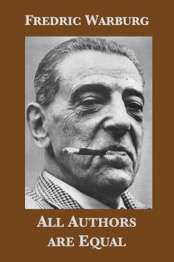 $9.99 on Kindle
$9.99 on KindleAll Authors Are Equal by Fredric Warburg (135,000 words and 3 illustrations)
Fredric Warburg, partner in the London firm of Secker & Warburg from 1936 until 1971, considered publishing an attractive occupation and a way of life. In this personal, often humorous memoir of his life until his retirement, Warburg picks up where he left off in 1939 in An Occupation for Gentlemen.
Warburg’s discussion of George Orwell’s Animal Farm and 1984 is an important contribution to literary history. Other chapters include Warburg’s landmark 1954 trial for publishing an “obscene” book, his edition of Kafka, the translation of Robert Musil’s The Man Without Qualities, his visit to the aged Colette, a sketch of Thomas Mann, the strange tale of The Bridge on the River Kwai, the rise of Angus Wilson to stardom. In perhaps the funniest chapter, Warburg describes how he was duped by a plumber from Devonshire who pretended to be a Tibetan lama. A 1952 business deal by Secker & Warburg with Heinemann anticipates more recent consolidations in the publishing industry.
Throughout Warburg’s memoir of literary and publishing history, the passionate personality of his wife, Pamela de Bayou, stands out, commenting on, criticizing and sometimes transforming a situation or a policy. All Authors Are Equal is for anyone who enjoys good books and the making of good books, and for all students of publishing.
In the author’s own words: “The book as a whole may be seen as the story of my publishing life, the chapters and sections of chapters are in the main stories within the story. So it is that the book is a hybrid not an autobiography, not a history of a publishing house, not a philosophy of publishing, not a series of critical studies, but a bit of all these. [...] The deeper feelings of publishers are not often revealed to their authors while the publishing relationship exists. The publisher tends to be wary, diplomatic, reserved, rather hopeful, slightly pessimistic, laudatory, jolly, critical, or so diverse a mixture of all these as to end up more or less blank. Praise is dangerous — it might give an author ideas. Blame is perilous — the author may stop writing or even seek another publisher. To tell an author the unvarnished truth, as the publisher sees it, is no doubt hazardous, but it is a policy I have always tried to follow as far as possible, and with that policy I have had more successes than failures.”
Praise for An Occupation for Gentlemen:
“An engaging autobiography... Mr. Warburg writes with a nice light touch and with considerable charm and humor. His remarks about publishing are interesting and pointed.” — Orville Prescott, The New York Times
“An entertaining and instructive book about two deep and ancient mysteries, human character and the trade of publishing.” — Jacques Barzun
“Fredric Warburg’s autobiography is... wonderfully engaging. Mr. Warburg is that rarity among publishers. He writes extremely well.” — Moss Hart



